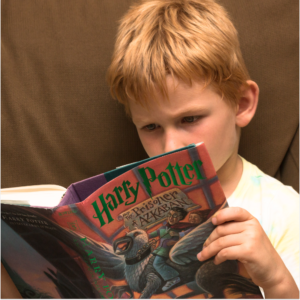17 year-old Ashley Solace is the winner of The Harbinger Prize 2024: Culture

JK Rowling has banned the publication of her books in Russia due to Russian invasion of Ukraine in February 2022.
October 17, 2024
Does Harry Potter have a passport?
I was born in 2006, a year before the seventh and final Harry Potter book was published.
Although I was too young to remember it, I know it was a blast, as was the release of the two Harry Potter and the Deathly Hallows movies based on it, in 2010 and 2011. The cinemas were packed with people.
As a gift on my tenth birthday, I got the whole Harry Potter series of books and a beautiful picture of Hogwarts, making me a HP fan for years. I even remember being jealous of my best friend, when her older sister brought her an actual Hedwig from the Harry Potter Museum in London.
My friends and I, we got the chance to read Stephen King and Neil Gaiman’s novels, cry at Tony Stark’s death in Avengers: Endgame, learn by heart Elsa’s song from Frozen, and see the first Inside Out on the big screen with popcorn and Coca-Cola. On weekends, we would watch the Disney channel on TV. If we wanted to switch, we would just press a button and turn on a Russian movie.
I had a great childhood.
I was raised on both international and Russian art. I was lucky to travel, to study in foreign schools, learn foreign languages, and pass Cambridge (English-language) and DELF (French-language) exams. My generation had a chance to explore different countries, read international books and watch American movies.
How young Ukrainians are coping after two and half years of war
Since 24 February 2022 – that day that Russia launched its full-scale invasion of Ukraine – more than 25 million Russian kids have lost that chance.
Best-selling authors including JK Rowling, Stephen King, Neil Gaiman, Jen Sincero and even Prince Harry, as well as many foreign publishers, have banned the publication of their books in Russia. Warner Brothers, Disney and Netflix have suspended services in the country.
Boycotting might seem like a good answer to the current Russian regime, but it doesn’t really prove a point and it also helps brainwash kids, giving an unlimited power to propaganda.
If the goal is to lead Russia’s population towards democracy, then cutting ties to international culture is not what should be done.
It is well known that propaganda focuses on the easiest target: children, since they are flexible and suggestible. Influencing a grown-up, or even a teenager, requires a lot more work, due to the fact that they have a formed opinion on the world around them.
I recently saw a video of a group of second-graders dancing at a school show to a song about the war. No war in particular, just a man singing about saving his country. It may seem nice and patriotic, but it is hard to believe that an eight-year old kid can truly understand the meaning of murder or even the concept of war.
Moreover, if their opinion is going to be founded specifically on Russian books, films and music, what will they believe in the future?


